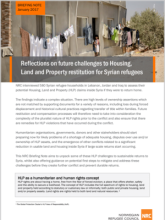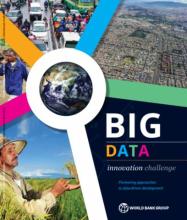Land Library
Bienvenue dans la bibliothèque du Land Portal. Explorez notre vaste collection de ressources en libre accès (plus de 74 000), comprenant des rapports, des articles scientifiques, des articles de recherche, des publications évaluées par des pairs, des documents juridiques, des vidéos et bien plus encore.
/ library resources
Showing items 82 through 90 of 4607.Governance quality plays a key role in private sector development: competent bureaucrats not only create good policies and regulations but also effectively implement them to shape the business environment.
A lack of access to finance has been one of the biggest impediments to the development and growth of the small-scale business sector in Indonesia.
NRC interviewed 580 Syrian refugee households in Lebanon, Jordan and Iraq to assess their potential Housing, Land and Property (HLP) claims inside Syria if they were to return home.
Many African countries rely on sporadic land transfers from customary to statutory domains to attract investment and improve agricultural performance. Data from 15,000 smallholders and 800 estates in Malawi allow exploring the long-term effects of such a strategy.
This Systematic Country Diagnostic (SCD) looks at why a country with such great potential has not been able to materialize it. The SCD analysis has identified several knowledge gaps.
The agricultural and food production sector plays a key role in fighting poverty and food insecurity in Moldova, but is facing critical challenges to modernize and integrate into the international market.
In the last four years Myanmar’s economy has seen a slight shift away from agriculture toward industry and services. This may mark the beginning of a structural transformation away from a rural, agricultural economy toward a more urban, industrial and service-based economy.
Big data can sound remote and lacking a human dimension, with few obvious links to development and impacting the lives of the poor. Concepts such as anti-poverty targeting, market access or rural electrification seem far more relevant – and easier to grasp.
Agriculture has been essentially the backbone of economic growth for centuries. The sector has provided employment for the majority of the world population for generations, and has served as a powerful force in transforming of economies towards an industry- and service- based.









